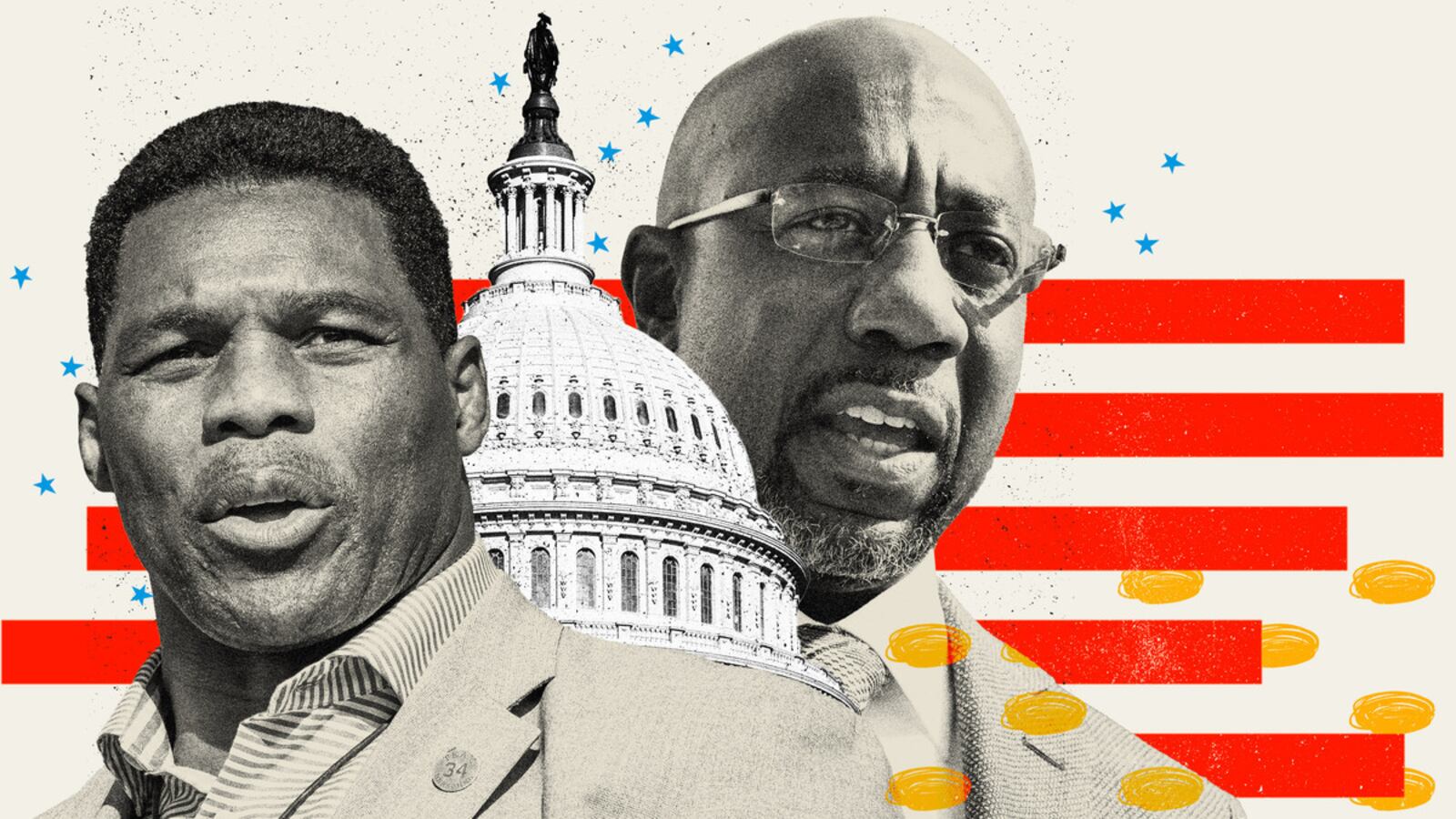For the second time in two years, Georgia voters showed up in droves for a nationally watched Senate runoff battle—and chose Raphael Warnock, the pastor-turned-Democratic star, to represent them in Washington.
On Tuesday, in a race called by the Associated Press, Warnock finally defeated his Republican opponent, the football legend Herschel Walker, in the final contest of the 2022 election cycle.
Although Democrats had already secured the Senate majority in the November election, Warnock’s victory is an exclamation point to a campaign season in which the party defied expectations that President Joe Biden’s unpopularity and a struggling economy would doom their hopes.
With 51 seats in the chamber next year, Democrats will have the power to confirm Biden’s nominees for the federal judiciary and administration posts far more smoothly. They’ll also no longer have to broker an agreement with the GOP to set the balance of power on committees.
For many Democrats, Warnock brings far more to the table than just a vote. One of just three Black senators, Warnock is a prolific fundraiser and skilled communicator. With a six-year Senate term ahead, he can finally begin building a résumé beyond his consecutive runoff wins during an essentially unbroken four-year marathon of campaigning.
For Republicans, Walker’s defeat caps a disappointing election cycle that saw them fail to flip any Democratic Senate seats despite being favored to win control of the chamber.
The loss—which many Republicans had expected—is sure to reignite the blame game that consumed top Senate Republicans after November, with Minority Leader Mitch McConnell (R-KY) and the campaign chief, Sen. Rick Scott (R-FL), openly squabbling about party strategy and alleged missteps.
The result will also further sour Republicans on Donald Trump. The ex-president was one of Walker’s key backers, and his defeat is just the last of many defeats suffered by candidates that Trump had favored most.
While Warnock was among the Democratic Party’s strongest candidates, Walker was one of the weakest candidates either party has fielded for a major race in recent memory. His campaign was dogged by reporting and allegations casting doubt on his character and fitness for office before he even launched his campaign in August 2021.
By the end of the campaign, many of the skeletons in Walker’s closet were out in the open. In the summer, The Daily Beast reported that Walker had multiple children he had never acknowledged publicly and lied to his own staff about the revelations—which also seemed to prompt his conservative influencer son, Christian, to publicly break with his father.
In October, The Daily Beast reported that Walker—an anti-abortion hardliner—had paid for a girlfriend to obtain an abortion in 2009. Ensuing reports from The Daily Beast and other outlets revealed Walker had pressured another woman to get an abortion.
Walker, who struggled to communicate clearly even on straightforward political topics during the campaign, typically only commented on these stories by issuing blanket denials. The results of the November election confirmed Walker’s weakness as a candidate: he was the only Republican running statewide who was outperformed by their Democratic opponent.
While Warnock led Walker by some 38,000 votes in the November election, the more telling figure was the 200,000-vote spread by which Gov. Brian Kemp outperformed Walker. The margin indicated that many Kemp voters either supported Warnock or simply didn’t vote in the Senate contest at all.
Thanks to a new Kemp-backed law, the runoff election was cut to four weeks, instead of the nine-week campaign Warnock won in 2021. Democrats were concerned that the abbreviated contest would limit early voting opportunities and favor Republicans, who tend to vote overwhelmingly on Election Day.
But Democrats fought to get as many voting opportunities as possible, successfully suing Secretary of State Brad Raffensperger to allow in-person voting the Saturday following Thanksgiving after he had initially refused to do so.
A bigger problem for Walker in the runoff was his loss of the central rationale of his campaign. Because Democrats had secured Senate control, he could no longer persuade reluctant Republicans to hold their noses and vote for him to end Democratic reign.
Instead, Walker pivoted heavily on culture-war issues—like participation of transgender people in women’s sports—while appearing to not understand which chamber of Congress he was campaigning to join.
But the scrutiny continued to flow on Walker through the runoff. Last week, The Daily Beast reported that a Walker ex-girlfriend publicly accused him of violent behavior, the first on-record allegation of that nature during his campaign. On another front, CNN reported that Walker—who had moved from Texas to run for Senate—was still collecting a tax break in the Lone Star State while running for office in Georgia.
In the final days of the contest, Walker’s light campaign schedule troubled Republicans—he was absent from the trail for five days around Thanksgiving—while Warnock began going for the jugular. While the pastor’s motto of “remain the Reverend” had guided his high-minded approach to campaigning, Warnock began to take a harsher tone against Walker in the final weeks of the race, directly highlighting the doubts over his opponent’s character.
The Democrat also had a substantial advantage in resources in making his case. Warnock’s campaign and Democratic outside groups outspent Walker and his allies by a two-to-one margin, some $52 million to $25 million, during the four-week runoff sprint. Notably, the PAC aligned with McConnell—Walker’s biggest backer during the general election—significantly pared back its TV ad spending in the runoff.
After having dominated Georgia for decades, Republicans will not have a chance to recapture a Senate seat in the Peach State until 2026. Between 2020 and 2022, Democrats will have spent a staggering $300 million to boost Warnock and turn this red state into a purple one.




